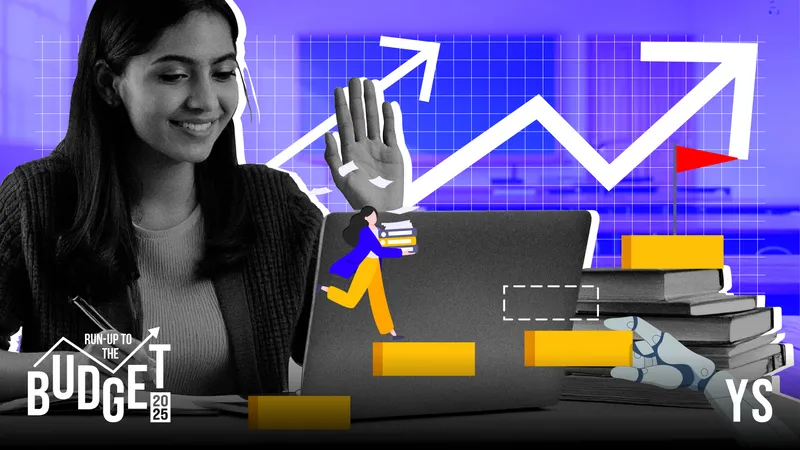Budget 2025: The big picture; Understanding tax reforms
This Budget focused on more spending power for the middle class, and less regulation in businesses. Personal annual income up to Rs 12 lakh per annum would be exempt from taxes. The edtech sector saw measures for expanding capacity in IITs and medical colleges, centres of excellence for AI.
Hello,
The government’s plan for growth hinges on you dining out and buying those premium products.
A major theme during this year’s Union Budget was putting more money into the hands of the middle class and increasing consumption and spending power. This comes as shoppers have tightened their purse strings of late in the face of inflation and slow wage growth.
The Budget also gave a nod to the emerging tech we’ve all been talking about: AI, deeptech startups won big with a Rs 20,000 crore Fund of Funds to fuel research and development.
This, along with the government’s plan to build a desi LLM under IndiaAI Mission, will position India to stand shoulder-to-shoulder with disrupters like DeepSeek in the AI arena.
Industry leaders were all praises for the Budget allocations, from CRED Founder Kunal Shah predicting a jump in Gen Z consumption due to the new tax slabs, to RPG Group Chairman Harsh Goenka calling it a “financial Maha Kumbh”.
Between anointing Nirmala Sitharaman as the newest champion of the middle class to counting the number of times Bihar was mentioned in the Budget, social media users found hope amid bouts of humour. (Fun fact: Bihar and its regions were referenced eight times in the entire speech.)
But hey, what’s Budget Day without a few memes?
In today’s newsletter, we will talk about
- Budget 2025: The big picture
- Understanding tax reforms
- Building a future-ready workforce
Here’s your trivia for today: Which Christmas carol became the first song ever to be broadcast from space?
In-depth
Budget 2025: The big picture
The Budget 2025 had two broad themes: tax relief for India’s middle class and the government’s intent to mostly stay away from business affairs.
The tax sop is a typical demand-led growth idea, with the expectation that this would lead to enhanced consumption, which would then spur businesses to invest to meet the higher demand. The investments could then lead to more jobs and higher incomes.
Key takeaways:
- Under a new tax plan, those earning up to Rs 12 lakh won’t have to pay any income tax. Earlier, it was at an income of Rs 7 lakh that one didn’t have to pay any tax.
- Startup categories such as ecommerce could benefit from the consumption boost that comes with the tax slab change.
- The second big takeaway is the government’s intent to pull back from too much regulation. “A light-touch regulatory framework based on principles and trust will unleash productivity and employment,” Sitharaman said.

Union Budget
Understanding tax reforms
India’s vast middle class finally has something to cheer about. To boost consumption and reduce the salaried population’s tax burden, Finance Minister Nirmala Sitharaman announced a slew of new tax reforms in the FY26 Union Budget presented on Saturday.
Tax break:
- In her Budget speech, the FM also said that the basic income exemption limit will be hiked from Rs 3 lakh to Rs 4 lakh.
- This year’s Budget also announced an extension of time-limit to file updated returns, from the current limit of two years to four years.
- The annual limit of Rs 2.4 lakh for tax deducted at source (TDS) on rent was also increased to Rs 6 lakh.

Education
Building a future-ready workforce
Finance Minister Nirmala Sitharaman unveiled a series of initiatives aimed at boosting education infrastructure and skill development. These include expanding capacity in IITs and medical colleges and establishing a centre of excellence in AI for education.
Skilling:
- The Finance Minister proposed expanding infrastructure at five Indian Institutes of Technology (IITs)—Bhilai, Goa, Jammu, Palakkad, and Tirupati—established after 2014, to accommodate 6,500 additional students.
- Apart from IITs, Sitharaman stated that 10,000 seats will be added in medical colleges and hospitals next year, as part of the broader goal of increasing capacity by 75,000 seats over the next five years.
- Focusing on technology in education, the FM proposed the implementation of the Bharatiya Bhasha Pustak Scheme, which will provide digital Indian language books for school and higher education, helping students gain a better understanding of their subjects.

Design: Nihar Apte
News & updates
- Hefty penalties: US President Donald Trump is expected to sign an order on Saturday imposing hefty new tariffs of 25% on goods from Mexico and Canada and 10% on imports from China, potentially disrupting more than $2.1 trillion worth of annual trade.
- Shelved: Apple has cancelled a project to build advanced augmented reality glasses that would pair with its devices, marking the latest setback in its effort to create a headset that appeals to typical consumers.
- Exodus: Meta is in discussions to reincorporate outside of Delaware, becoming the latest tech group to study exiting the state that has long been considered an American corporate haven.
Which Christmas carol became the first song ever to be broadcast from space?
Answer: Astronauts Tome Stafford and Wally Schirra sang “Jingle Bells” from space on December 16, 1965.
We would love to hear from you! To let us know what you liked and disliked about our newsletter, please mail [email protected].
If you don’t already get this newsletter in your inbox, sign up here. For past editions of the YourStory Buzz, you can check our Daily Capsule page here.







